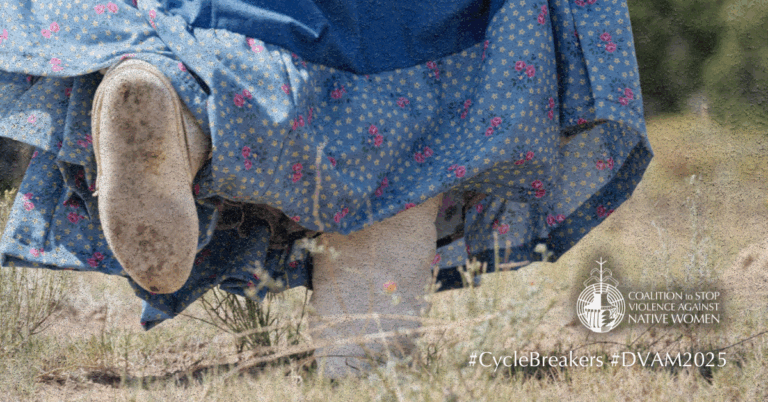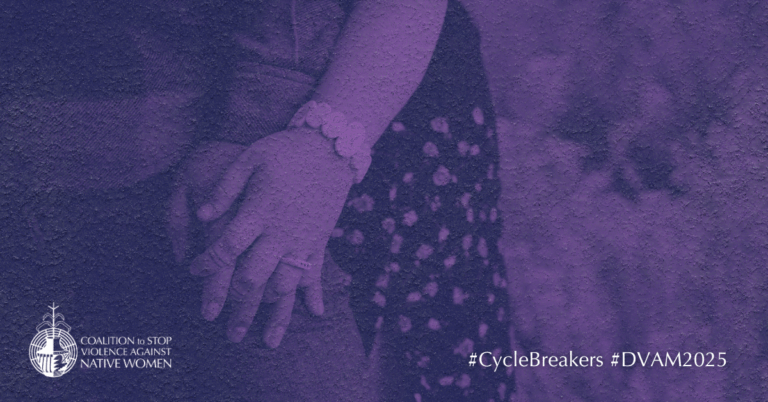January 2018 is National Stalking Awareness Month: Call It Out For What It Is
By: Keioshiah Peter
- Have you had someone follow you and show up wherever you are? Either online or in person?
- Has someone sent unwanted or excessive gifts, letters, direct messages, or emails to you?
- Do you feel like someone is monitoring your phone calls, computer use, or social media activity?
- Has someone posted information or spread rumors about you on the Internet, in a public place, or by word of mouth?
If you answered any of these questions with a “yes” for yourself or for someone you care about, you should keep reading this blog because it has information that may help you better understand stalking and cyberstalking.
To begin, the Coalition to Stop Violence Against Native Women acknowledges January as Stalking Awareness Month. We also recognize the long history of colonial violence and systematic oppression that lays the foundation for the disproportionate rates of violence against Native Women and children. No matter where you are, or where you come from, everyone has the inherent right to be and feel safe in their own home, community, and on their territory.
2018 has began with a strong force created by black and brown survivors affected by sexual violence and harassment who have chosen to speak out and hold perpetuators accountable through the #MeToo movement and hashtag. Let’s continue the add to the momentum created by Tarana Burke, a strong black women and founder of the #MeToo Movement, to empower and raise the voices of people of color affected by sexual violence and harassment. Today, we focus our attention to bring awareness on stalking and cyberstalking so that you can be armed with the knowledge that could help you or someone you love.
Stalking and cyberstalking is serious issue in our Native communities that can escalate quickly and affects almost everyone no matter where or what age you are. It can be committed by someone you don’t know, but it is often perpetuated by a current or former intimate partner throughout or at the end of a relationship.
Stalking is defined by the Stalking Resource Center as “a course of conduct directed at a specific person that would cause a reasonable person to feel fear.” It is a pattern of behaviors that targets a specific person and include the situations asked in the questions that begin this blog. It also includes the following:
- Damaging one’s personal property (home, care, electronics, etc)
- Using technology to track or keep tabs on their victim
- Driving by or surveying ones’ home, school, or work
- Threatening to hurt you, your family, friends, or pets
- Using public records, online search engine, hiring investigators, scourging through your trash
- Phishing for information on you from friends, family, neighbors, or co-workers
Cyberstalking, according to the WomensLaw.org ran by the National Network to End Domestic Violence, refers “to the misuse of the Internet or other technology to stalk and harass someone.” This includes harassment meant to cause fear through direct contact by email, social media networks, messaging app, or through Internet communities/spaces.
Cyberstalking is also an issue that research has shown to affect young people because of the peer pressure that exchanges affection and caution for “nudes” that can escalate to excessive requests, aggressive behavior, harassment and threats.” The New York Times article titled “Teenagers, Stop Asking for Nudes” by Lisa Damour calls for conversations between parents/guardians on cyberstalking and caution sending or asking for nude explicit photos because of the possible personal and legal consequences. To learn more about Harassment and Stalking along with Unauthorized Distribution of Sensitive Images laws in New Mexico, or your state, check out the WomensLaw.org website.
Stalking and Cyberstalking are serious issues that we need to discuss in our Indigenous communities and Nations if we want to continue the national momentum created by the #MeToo movement to spark change on the tribal, state, and federal level. We need to continue to advocate for the reauthorization of the Violence Against Women Act (VAWA) by Congress in 2018. To learn more about how to take action, End the Backlog has some great recommendations. We also need to continue to call out perpetrators of violence against Indigenous womyn and children to hold them accountable within our Nations because violence is not our tradition, and neither is stalking/cyberstalking.
If you feel like you or someone you care about is experiencing stalking or cyberstalking, here are some general suggestions for Safety Tips for Stalking Victims.
Available Resources
- Org – Safety Tips for Stalking Victims – https://www.womenslaw.org/safety-tips-stalking-victims
- National Network to End Domestic Violence – https://nnedv.org
- National Domestic Violence Hotline
1-800-799-SAFE (7233)
1-800-787-3224 (TTY) - National Center for Victims of Crime – Stalking Resource Center
Related Posts

Running Towards Healing and Justice
By: Ang Gonzales (they) intern at CSVANW Community Voice This Domestic Violence Awareness Month, I…

Our Stories, Our Strength: Voices of Cycle Breakers
Storytelling has always been medicine. For generations, our stories have carried the wisdom of our…

10 Years of Healing in Motion
The Story of CSVANW’s I Will Run for Them 5K Every October, during Domestic Violence…
